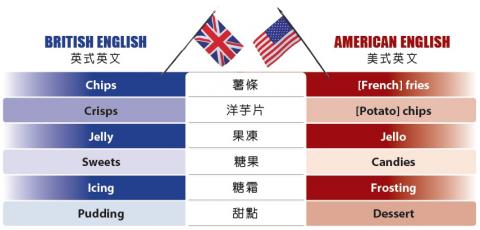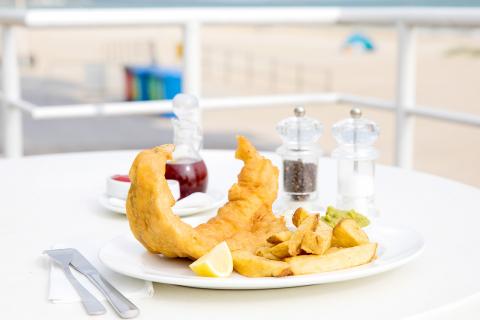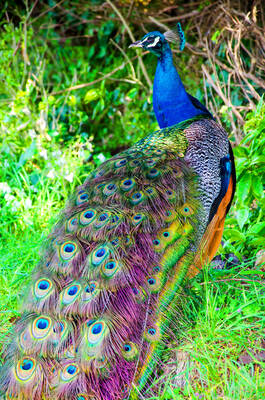The word “chips” means different things in American and British English. Chips in British English are usually thick-cut potato wedges, baked or fried, often served as a side dish with a main meal. In the US, these are usually cut thinner, in long, narrow pieces, and are called “(French) fries,” a term also used in British English to refer to this particular style of chip, often served with fast food. In American English, “chips” refers to wafer-thin slices of potato, deep fried or baked until crunchy: in British English, these are called “crisps.”
There are other foods given different names: cookies, referring to crunchy, baked snacks, are generally called “biscuits” in British English; biscuits in the US, however, are quick breads with a firm crust and soft, crumbly interior. Candies are “sweets” in British English; cotton candy is “candy floss”; cupcakes are “fairy cakes”; frosting is “icing”; popsicles are “ice lollies”; and jello is “jelly.”
The sweet course usually eaten at the end of a meal, called “dessert” in both American and British English, is also often referred to as “pudding” in British English. The word “pudding” can also be used for savory dishes in British English, and in fact originally referred exclusively to savory, not sweet, dishes, often in which meat or other ingredients were encased and then steamed or boiled: it is still used in this way with dishes such as “black pudding.” In American English, by comparison, “pudding” is used specifically for a milk-based dessert with a consistency similar to egg-based custards.

(Paul Cooper, Taipei Times)
「chips」這個字在美式和英式英文中的意思並不相同。英式英文中的「chips」(薯條)通常是烤的或油炸的厚切薯角,一般是做為搭配主餐的配菜。美國的薯條通常是切成細長條,稱為「(French)fries」。「(French)fries」在英式英文中也是指這種薯條形式,通常是搭配速食。在美式英文中的「chips」(薯片∕洋芋片),指的是油炸或烘烤至酥脆的馬鈴薯薄片,這在英式英文則是叫做「crisps」。
英、美式英文中食物的不同說法還有:美式英文的「cookies」(餅乾),指的是鬆脆的烘焙點心,在英式英文中通常稱為「biscuits」(餅乾);而美國的「biscuits」,則是外表硬、內部軟而易成碎屑的「quick bread」(速發麵包)。美國的「candies」(糖果)在英式英文叫做「sweets」;美國的「cotton candy」(棉花糖)是英國的「candy floss」;美國叫「cupcakes」(杯子蛋糕)的,在英國叫「fairy cakes」;美國的「frosting」(糖霜)是英國的「icing」;美國的「popicles」(冰棒)即為英國「ice lollies」;美國的「jello」(果凍)則是英國的「jelly」。

Photo: Bloomberg
照片:彭博社
一般在飯後吃的甜食,在美式英文和英式英文中都稱做「dessert」(甜點),在英式英文中也常稱為「pudding」(布丁)。「pudding」一詞在英式英文中也可指鹹味的菜餚──其實它原本僅指鹹味而非甜味的菜餚,通常是以肉或其他食材為內餡,然後蒸或煮熟──現今仍有此用法,例如「black pudding」(黑布丁∕英式豬血香腸)。美式英文的「pudding」(布丁)則是專指牛奶製的甜點,其軟硬度類似雞蛋做的卡士達。
(台北時報林俐凱譯)

A: Apart from US singer Camila Cabello, Singaporean pop diva Sun Yanzi has two concerts scheduled at the K-Arena this weekend. B: Having debuted in 2000, Sun is now touring again to celebrate her career that has spanned over a quarter century. A: I like all of her 13 albums, but she hasn’t released one since A Dancing van Gogh in 2017. B: I hear that her shows will feature videos made by generative AI that will look back on her albums. A: Really? That’s awesome. Her music can always bring back fans’ great memories. A: 除了美國歌手卡蜜拉,新加坡歌后孫燕姿本週末將在高雄巨蛋嗨唱2場。 B: 哇2000年出道的孫燕姿,終於再度展開世界巡演慶祝出道25年! A: 她出的13張專輯我全都很喜歡,但自從2017年《No. 13作品––跳舞的梵谷》她就沒再出過專輯了。 B: 聽說演唱會還有生成式AI影片,回顧過去所有專輯的精彩片段。 A:

A: Wow, Taiwanese pop band Sodagreen just held two concerts in Kaohsiung to mark the 20th anniversary of their debut. B: I’m glad they’re continuing to perform, even after taking several long breaks. A: Canadian singer Elijah Woods also staged a show in New Taipei on Tuesday, followed by US singer Camila Cabello, who is set to rock Kaohsiung tonight. B: I love Camila’s global hit Havana. It was the best-selling digital single of 2018, according to the International Federation of the Phonographic Industry (IFPI). A: The singer with Cuban-Mexican heritage was born in Havana, and her music has been influenced by her roots. A:

Peacocks are among the most beautiful birds in the world. Their bright feathers and graceful movements have fascinated humans for centuries. These magnificent creatures belong to the pheasant family and are found in regions across Asia and Africa. Let’s explore peacocks’ unique characteristics and cultural significance. There are three main species of peacock: the well-known Indian peafowl, native to South Asia; the endangered green peafowl from Southeast Asia; and the rare Congo peafowl, found in African rainforests. Although the term “peacock” technically refers only to males, many people use it for both sexes. Male peacocks display their colorful tail feathers, which

An alarming increase in hearing problems among young adults has been linked to “Auditory Processing Disorder” (APD). Health experts warn that this issue could be partially associated with the growing use of “noise-canceling” headphones. APD occurs when the brain cannot properly interpret auditory information, despite one’s hearing ability being fully functional. This can lead to difficulties in understanding speech, particularly in noisy environments or when someone speaks quickly. People with this condition often need things repeated or take longer to respond in conversations. While these noise-canceling devices offer clear benefits in blocking external sounds, overuse may affect the